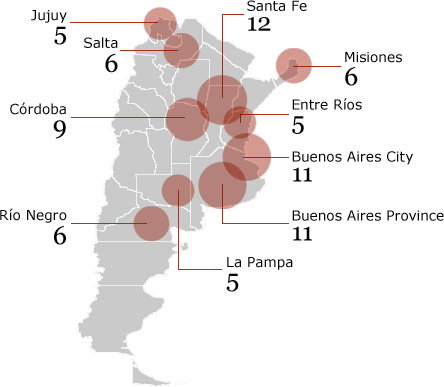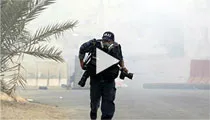Disputes between Cristina Fernández de Kirchner’s government and top media outlets intensified. Despite a Supreme Court ruling that ordered equitable distribution of state advertising, Kirchner’s government continued to withhold government ads from outlets critical of her administration, while lavishing business on those that provided favorable coverage, a CPJ special report found. Both the justice department and a federal appeals court fined the executive branch for ignoring the ruling, but the government showed no intention of complying. The administration also continued its practice of attacking and insulting journalists and executives associated with the country’s two principal media companies, Clarín and La Nación, sometimes using smear campaigns on public television shows. Those media groups, in turn, relentlessly criticized the government. The result was a highly polarized climate, with outlets devoting considerable coverage to discrediting one another, and citizens being deprived of objective sources of information on vital issues of public interest.
Argentina
» Kirchner administration ignores court, continues inequitable advertising.
» Government, top media companies are locked in debilitating dispute.
Disputes between Cristina Fernández de Kirchner’s government and top media outlets intensified. Despite a Supreme Court ruling that ordered equitable distribution of state advertising, Kirchner’s government continued to withhold government ads from outlets critical of her administration, while lavishing business on those that provided favorable coverage, a CPJ special report found. Both the justice department and a federal appeals court fined the executive branch for ignoring the ruling, but the government showed no intention of complying. The administration also continued its practice of attacking and insulting journalists and executives associated with the country’s two principal media companies, Clarín and La Nación, sometimes using smear campaigns on public television shows. Those media groups, in turn, relentlessly criticized the government. The result was a highly polarized climate, with outlets devoting considerable coverage to discrediting one another, and citizens being deprived of objective sources of information on vital issues of public interest.
-
2
Attacks in one week -
59%
Criminal libel decline -
47
Federal ads for Clarín -
3
Years challenging media law
In separate cases just days apart in August, assailants targeted provincial journalists Silvio Novelino and Hernán García, both of whom had covered alleged government corruption, according to CPJ research. An unknown attacker threw a Molotov cocktail at Novelino’s car, while a local official was alleged to have threatened García at gunpoint. The local press group Foro de Periodismo Argentino, or FOPEA, documented dozens of other press freedom abuses in 21 provinces between January and August 2012. Abuses included threats, assaults, attacks against media facilities, confiscation of equipment, and obstruction of coverage.

| Santa Fe: 12 Buenos Aires City: 11 Buenos Aires Province: 11 | Córdoba: 9 Río Negro: 6 Misiones: 6 | Salta: 5 La Pampa: 5 Entre Ríos: 5 Jujuy: 5 |
*Through August 1, 2012, as documented by FOPEA
The number of cases has dropped significantly since November 2009, when Congress decriminalized libel in matters of public interest, according to a report by the Center for Studies on Freedom of Expression and Access to Information (CELE), which tracked 16-month periods before and after the measure took effect. Criminal libel cases may still be filed if plaintiffs assert the matter does not involve public interest.
885
Libel complaints filed in the 16-month period before the reform364
Libel complaints filed in the 16-month period after the reformAccording to “Quid Pro Quo: Official Advertising in Argentina and its Multiple Facets,” a report written by Martin Becerra and published by the nonprofit Poder Ciudadano, the federal government placed only 47 advertisements with Clarín-owned television channels between May and October 2011.
2,274 | Federal government advertisements on state television station |
2,306 | Federal ads on pro-Kirchner Grupo Uno television stations |
1,555 | Federal ads on pro-Kirchner Grupo Infobae television station |
47 | Federal ads on Clarín television station |
Clarín has been fighting in court the provisions of a 2009 broadcast law that requires divestiture of significant holdings. Proponents say the law will curb monopolies and democratize media ownership, although critics say it also is intended to hurt Clarín.
October 2009: | New broadcast legislation requires Clarín and other companies to divest some holdings within one year. Clarín immediately files lawsuits contesting the constitutionality of the measure. |
December 2009: | A judge in Mendoza suspends implementation of the law while the challenges are pending. |
October 2010: | The Supreme Court finds other aspects of the law may take effect but upholds the stay on divestiture. |
May 2012: | Supreme Court rules that the divestiture injunction expires in December 2012. Government says it will enforce the law and Clarín must divest. |
December 2012: | A civil court extends the injunction until the underlying constitutionality issue is resolved. |

